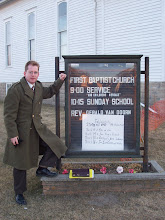The Baptists
The Christian denominations called "Baptist" have their origins in the "Radical Reformation" of the sixteenth century. In the 1520s, after being inspired by the teachings of Martin Luther and Ulricht Zwingli, a group of Protestants came to view their Roman Catholic infant baptism as invalid. They had themselves re-baptized and were then called Anabaptists, a name that means "those baptized again." They rejected this title but it stuck. Later in 1609, an Arminian preacher from England whose name was John Smith came into contact with Anabaptists in the Netherlands after fleeing to Holland for religious freedom. He became the first "British Baptist" and eventually joined with the Anabaptists. Anabaptists were active in England before the time of John Smith. Thomas Helwys, a disciple of John Smith, returned to England and started a Baptist church, which was then called "Anabaptist." In both England and in the American colonies, Baptists were often called "Anabaptists" in the early years. Roger Williams had nothing to do with the founding of the Baptist church and very little to do with founding of the Baptist church in America. He affiliated with the Baptist for a few short weeks. (After examining Scripture, Anabaptists came to believe that only those who repent of their sins and confess their belief in Christ are to be baptized. This means that they reject the baptizing of infants or small children. The earliest Anabaptists sprinkled or poured as a mode of baptism. Some still do. When it was discovered that the Greek word for "baptism" means immersion, certain Anabaptists and Baptist began to baptize by immersion.) The earliest British Baptist churches were the General Baptists. They denied the Roman Catholic belief in "Original Sin" and taught that Jesus died for all mankind, that his death was a "General" or universal atonement. Later, certain other Baptists became enamored with the bizarre teachings of John Calvin and began teaching that Jesus did not die for the sins of the world but rather that Jesus died for a particular group of people, called the "elect." These were the Particular Baptists. (Calvinists teach that God hates Mankind (except for the elect) and that God causes people to sin and then damns them for the things He Himself caused them to do. To a Calvinist, to say that people have a free will is to say that God is not sovereign. Thus, to a Calvinist, God is the direct source and cause of all evil and suffering in the world. They also teach a "Limited Atonement" doctrine which teaches that Jesus did not die for the sins of the world. "Limited Atonement" is clearly unbiblical and outside of Christian orthodoxy. The Roman Catholic Church has declared "Limited Atonement," also known as Jansenism, a heretical teaching.) The third of the three earliest groups of Baptists was called the "Seventh Day Baptists" because the adherents of this sect kept the Sabbath. Anabaptist groups include the Mennonites and the Hutterites. The Amish are a sect of the Mennonites. The Mennonites and the Hutterites are now pacifists. However, in the beginnings of the Anabaptist movement, many Anabaptists tried to establish justice through an armed revolution against their oppressors. These Anabaptist sects were brutally put down, and died out. The Hutterites do not possess personal property but hold all things in common following the example of the early church (Acts 2:44-45). Christian churches of the Baptist tradition include the Anabaptists, the Baptist and Brethren churches. This religious movement began in 1521 AD (with the Zwikau Prophets and other Anabapist groups) and was not founded by John the Baptist. Many Protestant churches practice believer's baptism by immersion.

No comments:
Post a Comment